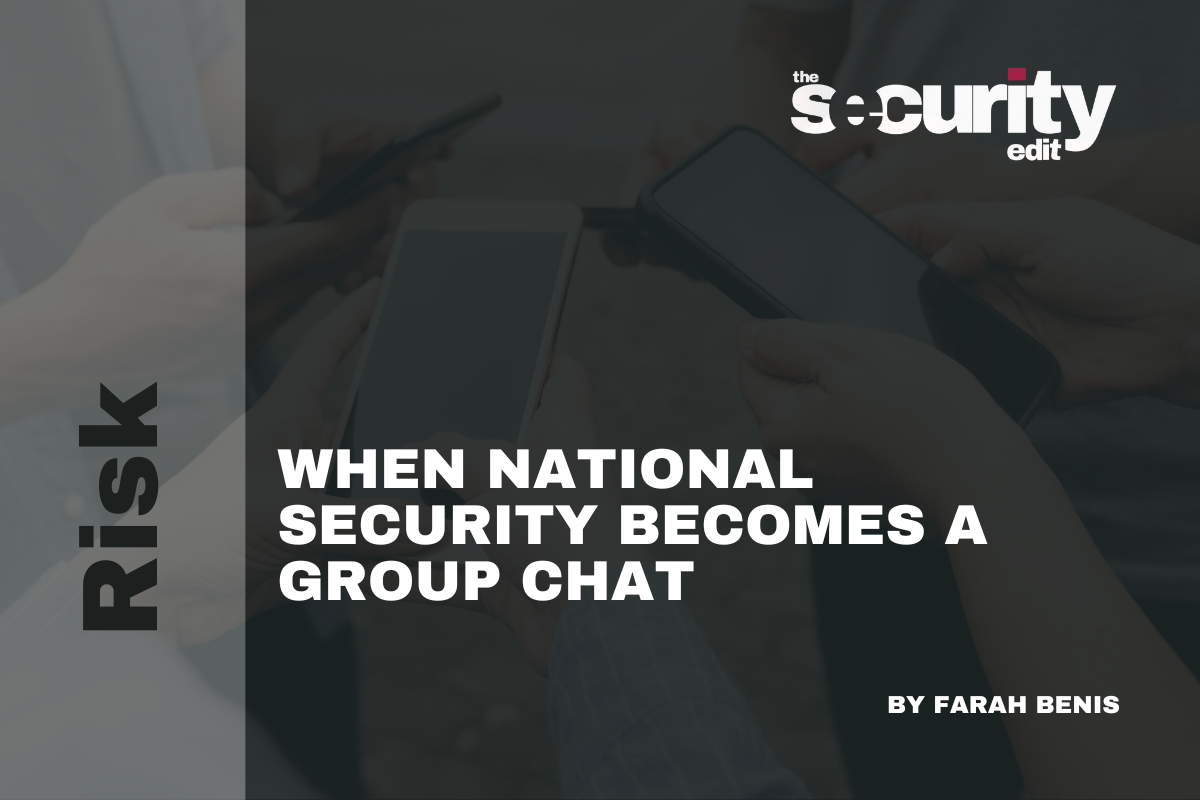When National Security Becomes a Group Chat
Inside the Signal Scandal That Exposed Far More Than War Plans
By Farah Benis
In the kind of blunder that will be dissected in cybersecurity and intelligence training for years to come, a group chat on the encrypted messaging app Signal - containing the sitting U.S. Defence Secretary, Vice President, and senior officials - accidentally included a journalist. That alone would be a headline. But what happened inside that chat over the next three days was nothing short of a masterclass in how not to conduct national security.
Despite public claims from official channels that “no war plans” were shared, The Atlantic later published time-stamped messages showing otherwise.
The messages revealed detailed operational strike information about a mission targeting Houthi rebels in Yemen - including weapon systems, drone timings, and airstrike launch windows - all sent in an unencrypted, consumer-grade group chat. The same kind of chat used to arrange birthday drinks or carpool logistics.
This isn’t just an embarrassment. It’s a systemic failure at the highest levels of power, with real-world security implications for allies, intelligence partners, and frontline personnel. It also reveals something far deeper: a blurring of the lines between official government conduct and amateur-hour digital politics.
A Timeline of Error
On 13 March, a Signal group chat titled “Houthi PC small group” was created. Among the members: Defence Secretary Pete Hegseth, Vice President JD Vance, National Security Adviser Michael Waltz, John Ratcliffe, CIA Director, Tulsi Gabbard, Director of National Intelligence, Secretary of State Marco Rubio, other senior officials and - inadvertently - The Atlantic editor-in-chief, Jeffrey Goldberg.
Waltz had earlier invited Goldberg to connect on Signal, and seemingly added him to the chat by mistake. Goldberg initially thought it might be a spoof. It wasn’t.
By 15 March, the day the strikes occurred, the conversation “veered toward the operational,” as The Atlantic reported. And from 11:44 AM onwards, the Signal group lit up with minute-by-minute updates from Hegseth on the timing, targets, and platform-specific deployment of U.S. strikes. He even prefaced one update with “TEAM UPDATE,” using all caps - as if narrating live from a battlefield Slack channel.
Some highlights of his messages:
11:44 ET: “Weather is FAVORABLE. Just CONFIRMED w/CENTCOM we are a GO for mission launch.”
12:15 ET: “F-18s LAUNCH (1st strike package).”
13:45 ET: “Trigger Based F-18 Strike Window Starts (Target Terrorist is @ his Known Location).”
15:36 ET: “F-18 2nd Strike Starts – also, first sea-based Tomahawks launched.”
All shared in real-time.
He ended with, “We are currently clean on OPSEC.” This would be ironic if it weren’t so alarming.
The Real Breach Was Common Sense
The Signal chat didn’t just violate “best practices.” It shattered the foundational principles of OPSEC. Operational security is about more than just encryption - it’s about context, control, access, and discipline. Even with end-to-end encryption, Signal isn’t certified for classified government communications. It has no mechanisms for clearance-based access, digital watermarking, or data compartmentalisation.
The participants weren’t just careless - they were recklessly overconfident, assuming that because the chat was encrypted, it was secure.
But this wasn't just about the app. It was about the environment. Metadata, open-source intelligence, and photos posted to social media showed that participants were communicating from unsecured locations - golf clubs, TV studios, flights - and possibly from personal devices. Some were physically with foreign counterparts or overseas.
To call this a security risk is putting it mildly.
When Leadership Starts to Look Like a Group Chat
This scandal doesn’t just raise questions about who had access - though that’s certainly one part of it, given a journalist was accidentally added to a high-level Signal thread. But it raises an even more troubling question:
How did individuals at the very top of government treat operational planning like casual backchannel banter - in a chat that accidentally included a journalist?
These weren’t outsiders roleplaying as powerbrokers. These were the people authorised to launch real-world military strikes, using Signal like it was a Slack thread - while attending diplomatic meetings, doing press rounds, or dining at Mar-a-Lago.
The tone of the chat, filled with emojis, all-caps updates, and gifs, blurred the line between formal military protocol and performative political theatre. What should have been a classified, tightly controlled decision-making process instead played out like a podcast brainstorm masquerading as a national security council meeting.
There are three wider implications worth drawing from this.
Firstly we have loss of institutional discipline. The behaviour in this chat reveals how digital platforms have eroded traditional norms of government conduct. Formal processes are being replaced by impulsive messaging. Power is wielded in memes and emojis, not classified briefings and chain-of-command deliberation.
Then we see digital complacency amongst the powerful. The same officials warning the public about Chinese spyware and TikTok are broadcasting mission-critical updates via Signal in real time - to an accidentally included journalist. The hypocrisy is astounding. So is the lack of consequence.
Finally it sets a precedent for global threats. This isn't just an American problem. If the world's most powerful military is run from a group chat, what does that tell hostile actors? That they don’t need espionage - they just need a phone number.
Final Word: This Is Not Just a Leak. It’s a System Failure.
The Signal chat scandal isn’t just a story of miscommunication or digital clumsiness. It’s a warning sign.
A government whose top security decisions are being debated in encrypted group chats, from golf clubs to press green rooms, is not a government demonstrating strength. It’s a government playing dress-up with national security while undermining the very systems that protect it.
Let’s stop pretending encryption is a substitute for competence. And let’s start asking the hard question: how many more chats like this are still happening - but haven’t yet been leaked?

